FÖN
Love and mountain tops
Hubert von Goisern is back - without Alpinkatzen, but down-to-earth again
It is six years since Hubert von Goisern said goodbye to the public at the height of his success with his Alpinkatzen. He wanted to write film music, travel and act. As a musician, he appeared with two exotic albums that his earlier fans rather received with astonishment. After the experiments with Tibetan and African musicians, the international commuter now turns his attention to a long-established music tradition on his new album Fön. Rustic alpine-rock numbers à la Hiatamadl are nevertheless past: jazz blues and reggae characterise the new melodic sound of the stubborn Austrian.
You made journalists climb the mountain for the presentation of your new album. Why must people always go upwards with you?
We went up a mountain with Aufgeigen stått Niederschiassen. At that time, we swore that we would go up the mountain again, if we went gold with the album. After the success, then I always obeyed this oath.
Does your music have a different effect surrounded by the mountains?
Not really. I felt a little peculiar with the first sounds: because you have glaciers on one side and wide valleys on the other, and you are listening to a music that has arisen from the technical surroundings of a studio. But everyone just listened to the music for an hour without speaking.
The title of your new album means a kind of autumn wind that comes from the mountains. The spelling, however, points to a hairdryer. (Note: Föhn is the usual spelling for the wind, Fön for a hairdryer)
I simply like the fact that just such a chaos rules in the German spelling. I thought, now at last I can do what I want to. I simply liked the word much better without the "h", I find it more aesthetic. At the moment I am for leaving out every flourish, and I don't like any embellishments which obscure one's view of the essential. The statement of one word is more significant than its spelling.
Has that also got something to do with the music you write today?
It is also like that with the music: the essential thing is to feel the true heart of things. When I make music many things are running through the subconscious. So I have to step back now and again, to have a look at its effect - like a painter.
How do you think Fön will be received by the public who liked the Alpinkatzen?
I don't know how people today get on with my music. Indeed six years have passed and a few things have happened - for example like the Tibet and Gombe CDs. I hope that nobody is expecting me to go back and do the same as before. I don't know how I will be if my audience at a concert calls for the old songs. But I have also previously sometimes argued with people in the audience who knew Hiatamadl from the radio and thought the whole concert would be like that. People who don't like what I am doing today should simply not come to the concert. If you don't change yourself, then you are already dead.
Does that mean that you only want to take new things to your concerts?
I trust in the new songs, the new band and in my own enthusiasm for making music and in the idea that I can so thrill the people that they will take me as I am. Someone who liked Inexil and Gombe less, must be really happy about the music I play on Fön.
Would this album not have been possible with your old band, the Alpinkatzen?
I looked for people whose style of playing fascinated me. That was just the enrichment I had wanted for the music I now want to play. These musicians do not come so much from a rock tradition. Indeed I would have always been susceptible, with the Alpinkatzen, to falling back into the old habits. In less than no time we would have been back there where we had stopped: with a hard rock translation.
There is a lot about relationships and women in your new lyrics...
When I compose I don't have the feeling that I do anything towards it. The sounds simply come, they develop from themselves. Sometimes a sentence and the melody suddenly come, in a stream. On the other hand, I also come upon some story in a rhythm or a melody. And relationships between people are simply the most intense thing there are. You cannot compare that with mountain summits, which are indeed very beautiful too.
Has the spirituality of the Tibetans influenced you? People attribute a certain inclination to the esoteric with you.
I have always found the word "esoteric" a bit funny. If anything then I am less so than before. When you work together with Tibetans for two and a half years and produce a CD in a land known for its mysticism, then you just about come back to earth. Basically, only a quite specific culture of myth rules there, much is only folklore.
Why do you always still exclusively sing in dialect, although you get involved so much in other cultures?
I find High German "unsingable". There is so much emotionalism in the German language through the hard consonants. Dürrenmatt said that High German is the father tongue and dialect is the mother tongue. In the first instance I feel I am a musician. Music without lyrics simply goes deeper. I cannot imagine singing lyrics which someone else has written.
In the film world you have not only established yourself with the soundtrack of Schlafes Bruder, but also as an actor. Will you play further roles?
I'm really not an actor, but I would like to be in a film again. If I can find a role to suit me. My role in Hölleisengretl, where I played a cunning servant, very much contradicted me.
"Going on tour again at last"
The man with a thirst for adventure, Hubert von Goisern, wants an audience again
Hiatamadl is past. In November 1994, Hubert von Goisern, at that time still known as an "alpine rocker", played the last concert with his Alpinkatzen. For two years, the robustly good-looking nature boy from Bad Goisern in Salzkammergut had the, at least in his view, dubious pleasure of being a pop star.
Then it was enough for him. Hubert Achleitner, the musician's civil name, retired, shook off the band and business in order to develop himself and to open something new.
And the tall, dark-haired Austrian was creative in many areas. He played the leading part at the side of Martina Gedeck in the film Hölleisengretl, composed film music, for Josef Vilsmaier's Schlafes Bruder among others. Then he drifted out into the world. The behavioural and chimpanzee scientist Jane Goodall invited him to Africa, to the Tanganyika lake. A film, film music and the CD Gombe arose from it. A second project was Tibet. After a tour with Tibetan musicians, he backpacked to Lhasa. Von Goisern expressed the necessity for solidarity with the oppressed on the release of another CD Inexil. Work which the critics really took notice of, the public hardly at all.
Now, Hubert von Goisern has come home - musically too. His new CD is Fön and comes on the market on 6th November 2000, in March a tour follows. He has found his way back to an alpine sound: folk music without folksiness. Even though the music hardly has anything in common with the releases of the Alpinkatzen, the pop-rock element is lacking. In the interview the musician takes a lot of time to explain about himself and his music. During this he radiates a tremendous calm and an inner strength as can only be done by one who has obviously got things sorted out.
It is still incomprehensible to many people why you, of all people, finished the collaboration with the Original Alpinkatzen at its most successful phase. What was the reason for you dropping out?
The absolute height had already been reached by the end of 1992. That is to say: two years completely flat out, red carpets everywhere, all wishes fulfilled. I had the feeling that we could just perhaps play two more years in Germany. Bigger concerts, where possible in stadia, could have been given and a great deal of money could have been earned. But I had already earned a lot of money and I didn't see the need for it. My musicians would certainly have happily gone on further. They were also angry with me when I stopped. But I did not find it exciting anymore. Each month that followed had become uninteresting for me. And to only continue because it is successful and I can rake in the money is too little for me. Added to that, I am too thirsty for adventure.
How was it then that it wasn't exciting any more?
That certainly lay with the programme. I played it so often, for so long, I simply wanted to do something new, and that had not been possible. Not in these surroundings with this acute public expectation on one side and with the dynamic of the band, the record company and the management on the other. It would really have become an act of violence. I had the feeling that I would have to twist everybody's arms behind their backs, just to get something exciting and new for myself. So I said to myself, "it is better you stop and pull back. And then come out of this silence." Then you can do something - without being influenced.
Public expectation certainly was not fulfilled with the last two CDs...
Yes, but expectations have never interested me.
Do you put your own requirements above everything else?
I would be desperately unhappy if it was the other way round. You cannot buy everything with money - neither with appearance nor other forms of success. Life is simply too unique for people to abuse it in this way.
Will there ever be another hit like Hiatamadl?
Probably not. I don't rule out the idea that I will one day write something that suddenly causes a "fuss". It was also two years until Hiatamadl became a hit. But another Hiatamadl, no, I do not need to do that again.
Will you play any old things on your new tour?
Heast as Nit, Wia die Zeit Vergeht. Otherwise nothing. I believe the title has something striking. Apart from that it is a song that one can play in a great variety of arrangements, without mourning the loss of an old sound. With songs like Hiatamadl, it would only be a copy, we would just be the second people to do it. Besides there is so much new material, even a few things which have not suited Fön. And I want to play songs from the Africa CD, Gombe. So the programme will be quite long enough. I would have to chuck out something new to play something old. I do not want to do that.
And how will you react if the audience loudly demand Hiatamadl?
That would depend on what sort of mood I was in and how this wish was put to me. But I will not play it. I will say with a clear conscience: "We cannot play it live!". I hope, I even expect from our audience, that they are open to something new.
This "something new" is a very personal CD. Many songs revolve around love for example. But there is also a political song. Is Kålt a statement about Jörg Haider, and in the booklet, why are a few text passages from this piece encoded?
The number is mostly lyric-less. What I sing is simply onomatopoeic and meaningless nonsense. Because there are people who basically give out meaningless stuff, brandish insubstantial, meaningless talk and with this empty talk hypnotise the masses. What they say is absolutely interchangeable. When I wrote the booklet, I asked myself, "Now what am I going to write at the point where really nothing will be said?" First of all I put in some signs and then I said to myself, "Man! That looks like a code." I was gripped by the joy of playing and programming and then I tried to encode the lyrics myself on my laptop. I was successful. I simply took quotations from Jörg Haider and encoded them. I found a playful solution. Above all, I did not want to give this man a platform in my booklet. I begrudge him that. But in this playful form I found it quite funny.
Reactions are inevitable...
I hope so. In everything I do, I hope for a reaction. And a discussion just with songs like these will be important to me.
The lyrics could also suggest that you are carrying thoughts of emigrating. How does that fit with your love of the Austrian homeland?
No, I don't want to emigrate. I feel bound to this culture and country, whether I want to or not. This closeness is for me also something like a licence to be allowed to criticise this society too.
Do you think about political involvement?
No, that's not my territory.
Do you understand the new CD musically as a break, a new beginning, or as a further development?
After six years one can indeed talk of a break. There is already a deep gap. In the new production, the rock element for example is missing. It is made with more subtly - lyrics as well as arrangement and melodic direction. But I also have the feeling that the CD somewhere ties in to what has gone before, only I have come a few steps further.
Do you think Fön will have similar success to the old things?
Actually everyone has prophesied that it won't be successful. But that always happened in the past. In the first place I wrote this programme because I finally wanted to go on tour again. I like the direct contact with an audience. I want to see: "What triggers it off? What happens with me?" A concert is always a communication with the audience.
After Hölleisengretl the critics acknowledged you as the ideal person for the demanding homeland film genre. Many people expected you to move over into acting.
Yes, I would have thought so too. I would not have made Hölleisengretl if I didn't have any further ambitions. But there were no roles on offer afterwards which would have been under discussion. And something like mountain doctor? No! Mind you, I am hopeful that some time it will work again sometime and I am also working towards it. I am simply dependent on enquiries.
Goisern, the eternal folklore rebel
"For many, folk music is always taboo. But for an artist, there is nothing more attractive than taboos!"
For six years, he aired himself thoroughly, now he breathes his very own folklore breath into concert halls again. Hubert von Goisern is here again. The man who first whetted the appetite of the music chart consumers for folk music in 1988, satisfies this hunger with his current work Fön, once more of high standard. Only three months after the album's release 25,000 CDs were sold, testifying to the unyielding desire for Goisern's folklore. On Fön, he revives Styrian tunes with Latino influences, reggae, jazz, rock and classical, with which concert halls across Austria should also pulsate from March.
No light practice to take care of after six years abstinence from the stage. After Goisern performed his last Juchizer with his Alpinkatzen in 1994, he went to Tibet and Tanzania, where he visited the legendary chimpanzee scientist Jane Goodall. Both journeys brought forth unusual albums (Inexil and Gombe), still no tour. Now he is "shit scared about the stage comeback" as he says in the Action interview.
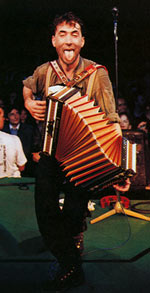 Barely back, you are honoured with a gold disc. A success
you expected?
Barely back, you are honoured with a gold disc. A success
you expected?
I say reluctantly that I have expected it because it sounds arrogant. But because of the success of the past, anything else would have been a wonder. But the gold disc is rather unpleasant for me. Fuss about something that is obvious anyway.
Nevertheless it is a good omen for the coming tour...
At the moment, it is in the way, because the tour makes me nervous. What really counts for me is how the concert functions.
Nervous after all these years?
I have always been a nervous person. At the beginning, before each show I threw up and believed that I would not manage on the stage. As soon as you stand up there, everything is over, like with climbers: at the beginning of the precipice, you are scared stiff and inside, you know: there is no room for fear any more. After six years abstinence, with a new band and my high demands, I am back at the beginning again.
Why has it been so long?
Actually it should only have been two years. Then I got to know Tibetan musicians and the meeting with Jane Goodall pulled me to Africa. I just slipped in. And suddenly, after both projects, I had the need again to write numbers that only concerned me, where I did not have to ask anyone whether it was okay.
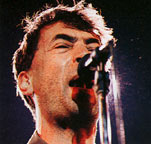 A
Styrian who made Tibetan and African music, is that so controversial
as it has superficially seemed?
A
Styrian who made Tibetan and African music, is that so controversial
as it has superficially seemed?
There is already a connection: I have always occupied myself with regional problems and cultures, the opposite of pop music that is at home everywhere and nowhere. Right with the Tibetans, whose culture is threatened by extinction, I had the feeling of being able to help. Helping to not just see their tradition as out of date. Because a culture can only survive if it can make a reference to here and now.
Since your leading role as liberator of homeland folk music, has anything in Austria changed in this regard?
Not really. It is still a taboo for many people. But for an artist, there is nothing more attractive than to discover a taboo. With that the controversy succeeds in showing people what regionality is really about, which must not be wasted in favour of turnover, whether in Salzburg, Tanganyika or Tibet.
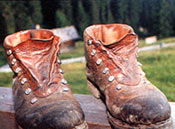 Where
do you place the reason for making a taboo of folk music?
Where
do you place the reason for making a taboo of folk music?
The reason, why people are ashamed is the same as fifty years ago: the past, in which national socialism fixed folk music to the flags. After that it was because most people had been killed or were in exile. The first people to have approached again were phenomenon-like Musikantenstadl. I quite understand that people with taste distance themselves from it.
Now your ex-band colleague Zabine is also venturing into a solo career. What do you think about that?
I am pleased because it is the most creative, identifiable thing that has happened to Austrian pop music for a long time. Count Basic or C-Bra are also not bad, but without identity. What she is doing is innovative. I hope that she has the staying power to bring it to the point where it could make it.
Super? I am Hubert ...
... von Goisern. How the alpine rocker is announcing new and old competition after a break from yodelling.
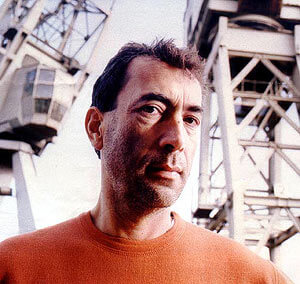 The
brass band leader took care of the throwing out personally. The impertinent
little lad with long rat's tails does not need to put in an appearance
any more, groused the leader of the brass band, in Austrian Bad Goisern:
Down with the traditional dress! The end of yodelling and folk music!
The
brass band leader took care of the throwing out personally. The impertinent
little lad with long rat's tails does not need to put in an appearance
any more, groused the leader of the brass band, in Austrian Bad Goisern:
Down with the traditional dress! The end of yodelling and folk music!
"I howled, when I had to give up the trumpet," Hubert von Goisern still remembers today, almost 30 years later. At that time he was still called Achleitner. As if in revenge, he later gave himself the pseudonym "von Goisern" and rocked with what was holy to his fellow brass band members. With squeezebox and e-guitar he poached from traditional songs - and earned splendidly.
The 48 year old has sold over 1.5 million CDs all in all and has bagged half a dozen gold CDs - the most recent, last Monday in his studio in Salzburg.
The awarded work is Fön with which he made "The Comeback of 2000" (AZ) after a six year break. The tour beginning in March is already sold out in many places. Punctually at the start, he straight away throws yet another CD out onto the market: Trad. On it are his new recordings of traditional melodies, which are otherwise still only performed with dulcimer and zither. "The best of 150 years of alpine folk music," as Hubert von Goisern immodestly explains his choice.
His new band have "purified" the old stuff. "It now sounds really cool, but it is the same material." That is so strong that he hopes to leave more traces behind "as with everything I have made before".
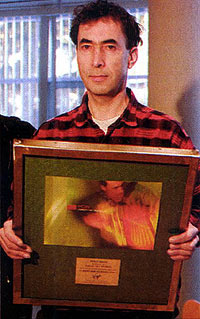 It
was ten years ago that the "yodelling punk from Austria", as
the US critics called him, appeared for the first time on the other side
of the Alps. "Folk music lives!" proclaimed the mountaineering
enthusiast at the time and got even with the "murderers" -
like those who appeared on Musikantenstadl.
First he played before a little crowd of city environmentalists. Then,
after his hit Koa Hiatamadl resounded
from the radio, in the biggest halls of the Republic.
It
was ten years ago that the "yodelling punk from Austria", as
the US critics called him, appeared for the first time on the other side
of the Alps. "Folk music lives!" proclaimed the mountaineering
enthusiast at the time and got even with the "murderers" -
like those who appeared on Musikantenstadl.
First he played before a little crowd of city environmentalists. Then,
after his hit Koa Hiatamadl resounded
from the radio, in the biggest halls of the Republic.
As quickly as he rose, came the surprising end in 1994. The project was exhausted, felt the singer at the height of his success and disbanded his Original Alpinkatzen. He wrote music for the Vilsmaier film Schlafes Bruder, had one or two appearances in films and the gossip columns alleged affairs. The heart-throb vehemently denied them and then there was peace in Bad Goisern.
Ape music. The most famous resident of the spa town, after Jörg Haider, did what he had done best before his fame: he climbed mountains and drifted around the world. On his journeys he listened to the singing of Tibetan monks and African apes. Two CDs came from it - and 100% politically correct and unmarketable, one should think. All the same, 100,000 starved fans seized them nevertheless and the father of two children since has the certainty that "there are always enough people who buy my music."
His record company was nevertheless pronounced to be relieved, when he approached the previous autumn with the new material. "Hubert yodels for the masses again," rejoices the manager. Nothing esoteric for the fringe group, but well tested, timeless pop. The musician himself describes the difference from the earlier albums as "less noisy". "Not so dominated by rock any more, more funk and soul."
There is of course nobody else to shock with crashing guitar. Not even Goisern's favourite enemy, Karl Moik. And today, wild Tracht combos come marching through this Musikantenstadl. "Since Hubert's success, there are no more bands who will not strangle the electric guitar," criticises the manager, Hage Hein from Munich."I nearly lose my mind when I see those guys posing like rockers."
No matter whether Kastelruther Spatzen or Alpenrebellen, Klostertaler, Zillertaler, or any other "talers", all strive for power, as daring as possible to get there. A trick which worked excellently over the years and guaranteed a higher place in the charts has however been ridden to death, as those in the industry report. Except for the absolute stars, the record industry is tougher and tougher. At most, the joke number Anton aus Tirol from DJ Ötzi lets him rake in the money.
The live business still buzzes. Also on TV there will be heart-breaking yodelling taking up the whole evening. "Absolute cheek," thinks Goisern, "always the same rubbish". Just let a record company boss get the idea of sending him to one of these "unspeakable shows" as a PR stunt. Then the musician will be like the traditional rebel from the old brass band days. "I will never go to Karl Moik. Never."
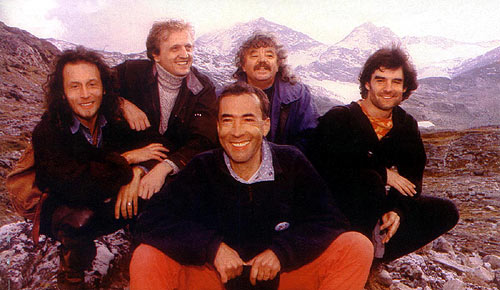
Daddy of alpine rock
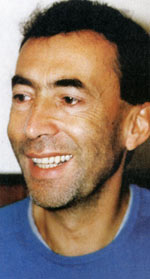 Hubert
von Goisern is here again and has laid out a beautiful picture in order
to illustrate his turn away from the pop world. "When I started," he
says, "I shook people up. At the end, I worried that was one of
the people being shaken up. That's why I ended the Alpinkatzen.
I had to make room in order to experience something."
Hubert
von Goisern is here again and has laid out a beautiful picture in order
to illustrate his turn away from the pop world. "When I started," he
says, "I shook people up. At the end, I worried that was one of
the people being shaken up. That's why I ended the Alpinkatzen.
I had to make room in order to experience something."
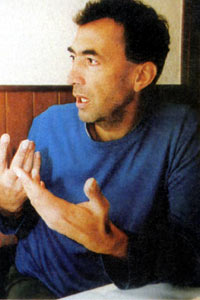 1988
- Hubert Achleitner alias Hubert von Goisern made the name of his birthplace
his own, in order to surprise the world with an alpine avalanche. He
paired rock rhythms with folksy melody elements and thereby proving that
there is not only Kaiserschmarrn, Jause and Prater (sweet pancakes, snacks
and a famous part of Vienna) in Austria, but an exceedingly lively music
scene, where neither ashamed nor shy, the two dissimilar siblings, Tradition
and Modern, are left to run hand in hand. With his Original
Alpinkatzen, he celebrated wild success worldwide (even in the
USA) until 1994. After the definite end of the Alpinkatzen,
he devoted himself to film music for a while. His most well known opus
is probably the title music to Joseph Vilsmaier's film Schlafes
Bruder. Several life influencing acquaintances - among others
the encounter with Jane Goodall, the famous gorilla scientist, induced
him to develop from alpine rocker to world musician. Long stays in Tibet
and Africa followed. The result was the two albums Gombe and Inexil.
Then in summer 1999, the desire awoke once more in von Goisern "to
compose something" and in autumn 2000 he published his fourth studio
album, Fön.
1988
- Hubert Achleitner alias Hubert von Goisern made the name of his birthplace
his own, in order to surprise the world with an alpine avalanche. He
paired rock rhythms with folksy melody elements and thereby proving that
there is not only Kaiserschmarrn, Jause and Prater (sweet pancakes, snacks
and a famous part of Vienna) in Austria, but an exceedingly lively music
scene, where neither ashamed nor shy, the two dissimilar siblings, Tradition
and Modern, are left to run hand in hand. With his Original
Alpinkatzen, he celebrated wild success worldwide (even in the
USA) until 1994. After the definite end of the Alpinkatzen,
he devoted himself to film music for a while. His most well known opus
is probably the title music to Joseph Vilsmaier's film Schlafes
Bruder. Several life influencing acquaintances - among others
the encounter with Jane Goodall, the famous gorilla scientist, induced
him to develop from alpine rocker to world musician. Long stays in Tibet
and Africa followed. The result was the two albums Gombe and Inexil.
Then in summer 1999, the desire awoke once more in von Goisern "to
compose something" and in autumn 2000 he published his fourth studio
album, Fön.
Fritz - Das Magazin spoke with the tireless adventurer about the Alpinkatzen, Jane Goodall and about life in Tibet.
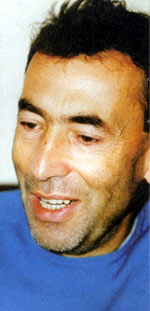 With
the Alpinkatzen you were at your musical
peak. You travelled to, among other places, the USA, Japan and England.
Everyone loved your music. Why exactly did you end this project so abruptly?
With
the Alpinkatzen you were at your musical
peak. You travelled to, among other places, the USA, Japan and England.
Everyone loved your music. Why exactly did you end this project so abruptly?
I had achieved all there was to achieve. There was nothing more in it, except to repeat the project and to repeat it again and earn more and more money. That was simply not in my mind. I am a person who looks for adventure. That's why I imposed this break on myself.
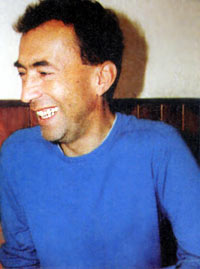 Did
you really plan to break for six years?
Did
you really plan to break for six years?
No. What was planned was to pull back for two years in order to devote myself to projects for which I had previously had no time. That became six years. Not because nothing occurred to me for so long, but because it was so exciting, what happened, so many meetings. All the same, all in all, four CDs arose from this time.
What has induced you in the last year to record a new CD?
The psychological trauma was simply too great for me. Two and a half years ago, after the release of the Tibet CD and the Africa CD, I said to myself: "The next thing I do is write a programme with which I can let myself be seen on the stage again."
How did you come to work with Tibetan musicians?
I was in Tibet for five weeks all in all, although I did not go there in order to get to know Tibetan musicians or to gain inspiration with a particular aim in mind. I really got drawn into the project. I was asked if I could accompany Tibetan musicians and dancers on their Austrian tour and present the show, because there were hopes that more people would come if my name was there as presenter. And I did that. Free of charge, that goes without saying.
What were your experiences like with this really peculiar mythical music?
Interesting and fascinating at the same time, even when I realised that I had understood little if anything of what happened there musically. Naturally there is something like a nonverbal understanding there, but for me what happened was already very mystical and I simply wanted to understand it more.
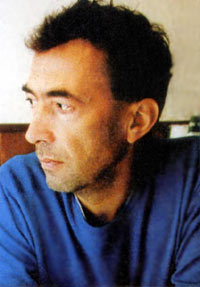 In
your opinion, how important is their traditional music to the Tibetans?
In
your opinion, how important is their traditional music to the Tibetans?
I noticed that the Tibetan music is purely out-of-date. It is not what there is in the present. I remember how it was with traditional Austrian music, before I went to the start and moved them into the here and now. It seems to me that during the day they listen to Hindi-Pop or Anglo-American pop music when they are at home and wearing jeans and T-shirts, but in the evening, they put on the Tibetan gear and open up a culture that they do not actually know at all because most of them were born in exile and personally live a completely different life from that about which they sing. Back then I advised them to create a contemporary reference. They thought these ideas were attractive and so it happened that we came together in the studio in order to record the Tibet CD.
Tell us a little about your meeting with Jane Goodall. How did you get to know one another?
Yes, that is an unusual story. Jane came to me at that time in Bad Goisern. In deepest winter she dropped in on me out of nowhere, because a friend who knew her wanted to introduce her to me. We talked all night and exchanged a huge number of ideas. So arose a deep friendship. She repeatedly invited me to South Africa and sometime I had the insatiable desire to portray this woman, to make a film about her life and philosophy. The work with "her" gorillas and chimpanzees, with whom she has lived in close contact for years on end, her commitment to world peace and above all her uncompromising will not to tolerate the world the way it is. Jane Goodall is an incredible woman and it was an honour for me to shoot a documentary about her. I will still need a bit of time to complete it. I want to go ahead very precisely, for it was she who advised me to go on stage again, as she said: "I look at you, how it drives you. Only courage and when you then go on stage again, it will be as in the story where the father returns home after a long journey."
